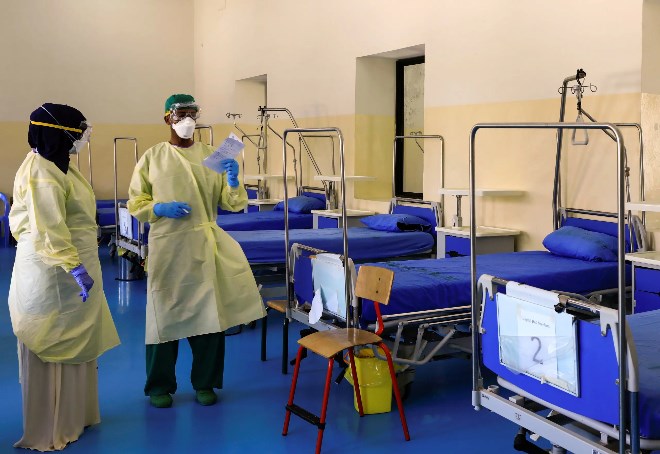With only one dedicated COVID-19 hospital for 15 million people, Somalia is bracing for a catastrophic coronavirus outbreak, doctors warn.
The single hospital equipped for coronavirus patients, located in the capital city of Mogadishu, has only 20 ICU beds, according to Dr. Deqo Mohamed, a senior doctor working at the hospital.
“We have over 1,400 cases confirmed and almost 70 percent of daily testing comes back positive. That can tell you how severe the outbreak is and how it’s getting worse,” said Dr. Mohamed, an adviser to the Somali prime minister’s COVID-19 taskforce, in an interview with Al Arabiya English.
The World Health Organization (WHO) warned last month Africa may become the next epicenter of the coronavirus pandemic. Somalia has the second highest number of cases in East Africa after Djibouti, and also has one of the world’s weakest health care systems.
Medical resources are scarce, according to Dr. Mohamed, who said there are only four PCR testing machines in the entire country. By the time Somalia receives more supplies, it will be too late, she added.
“We are expecting more resources, but the whole world is in scarcity. The WHO is saying they are trying to bring more resources, but by the time they bring them, it is going to be too late,” she said.
Worst prepared country
Somalia is the worst prepared country to deal with coronavirus, according to US-based think tank RAND’s infectious disease vulnerability index published in February. Somalia ranked 194 of 195 countries in the Johns Hopkins Global Health Security Index for 2019.
Somalia’s coronavirus response is not just inhibited by a lack of medical equipment and supplies. Preventative measures are impossible to implement in the war-torn country.
Social distancing, facial masks, and working from home are not possibilities for the Somali population. Attempts to impose coronavirus restrictions, such as a curfew, have been met with protests.
“The majority don’t practice social distancing and don’t wear masks,” said Dr. Mohamed. “And we cannot stop people from going out to work because of their daily income, which is 2 to 3 [US] dollars.”
The country has been embroiled in conflict for three decades, with an estimated 2.6 million people currently internally displaced.
Somalia’s most vulnerable
This vulnerable population is a focus for Dr. Mohamed, who is working with colleagues from Yale University and the University of Cambridge to assess the health of internally displaced people (IDPs) in the Mogadishu area, who are living in camps with poor sanitary conditions.
Little information on the health profile of refugees and IDPs exists in Somalia, according to Jude Alawa, a Rotary Scholar and Yale University Fox Fellow at Cambridge who is working with Dr. Mohamed to assess IDP camps in the country, identify the most at-risk individuals, and prevent the spread of infection.
Alawa said the goal of their work is to provide the government and non-governmental organizations with information to strategize the best methods to support displaced populations in Somalia during the COVID-19 outbreak, and beyond.
Dr. Mohamed said that there has already been collaboration between medical and governmental sectors in the country, which may be the only good outcome of COVID-19.
“For the first time in my life, in my practice of fourteen years of medicine in Somalia, the government and private sector are asking us what to do,” said Dr. Mohamed.
“This will be the first time we will be focusing on reform. We want to make sure we used this opportunity to rebuild the healthcare system in Somalia,” she added.
“In such difficult circumstances, there are often local heroes who step up and respond, according to Dr. Kaveh Khoshnood from the Yale University School of Public Health and a colleague of Dr. Mohamed.
“Our role as members of the international public health community is to support such local heroes,” said Dr. Khoshnood, adding that the local community is much more likely to trust and listen to local health care workers like Dr. Mohamed than outsiders.
Source: Al Arabiya News





























